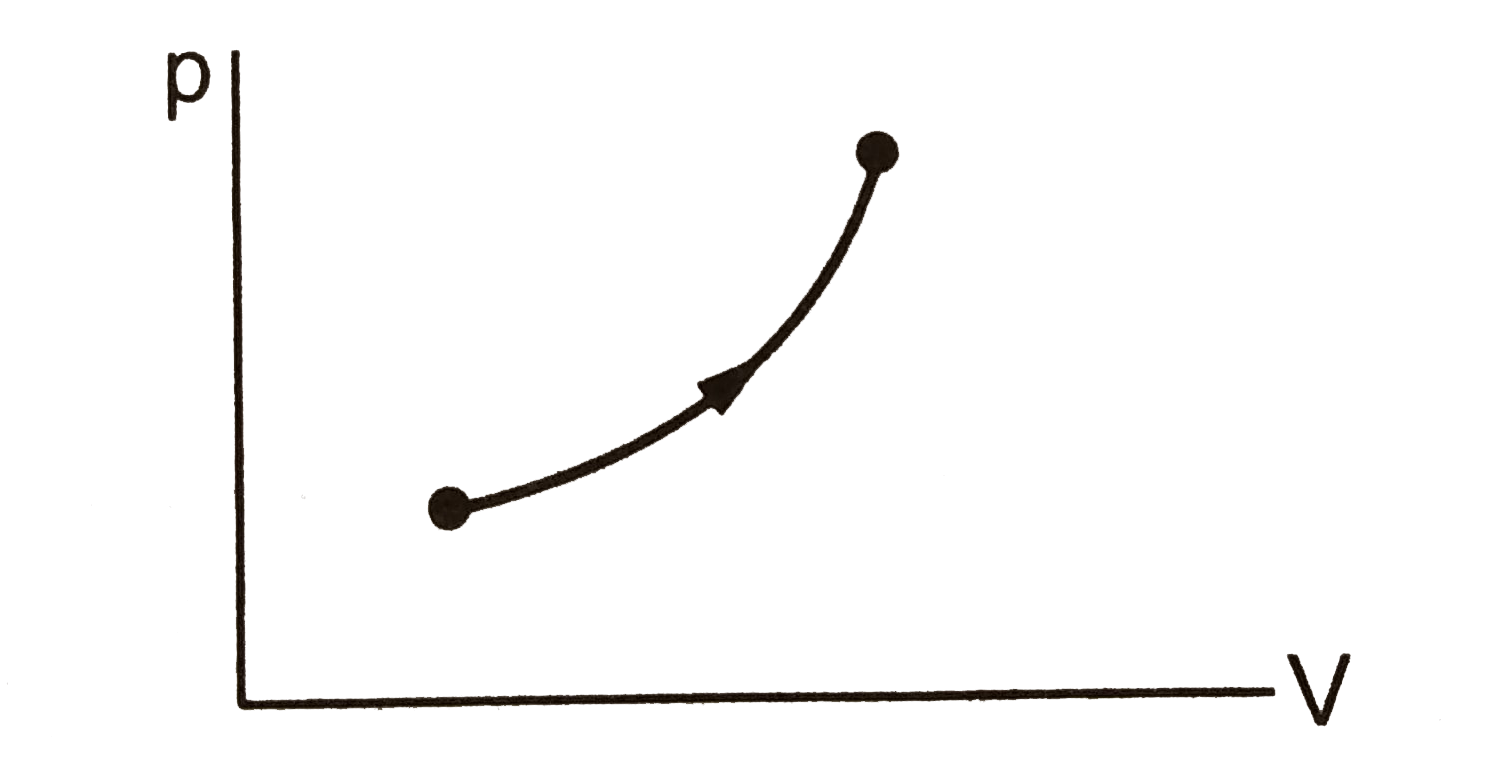If heat is added at constant volume, 6300 J of heat are required to raise the temperature of an ideal gas by 150 K. If instead, heat is added at constant pressure, 8800 joules are required for the same temperature change. When the temperature of the gas changes by 300K, the internal energy of the gas changes by
5000 J
12600 J
17600 J
22600 J
The correct Answer is:B
To solve the problem, we need to find the change in internal energy (ΔU) of an ideal gas when the temperature changes by 300 K. We are given two scenarios: one at constant volume and one at constant pressure.
1. Understanding the Given Information:
- At constant volume, the heat added (QV) to raise the temperature by 150 K is 6300 J.
- At constant pressure, the heat added (QP) to raise the temperature by 150 K is 8800 J.
- We need to find the change in internal energy when the temperature changes by 300 K.
2. Using the First Law of Thermodynamics:
The first law states:
ΔQ=ΔU+ΔW
- At constant volume, ΔW=0, so:
QV=ΔU
- Therefore, for the first scenario:
ΔU=QV=6300 J
3. Finding the Change in Internal Energy for 300 K:
- The change in internal energy is proportional to the change in temperature. Since we have the change in internal energy for a 150 K change, we can find it for a 300 K change.
- The relationship can be expressed as:
ΔU2ΔU1=ΔT2ΔT1
where:
- ΔU1=6300 J (for ΔT1=150 K)
- ΔT2=300 K
4. Calculating ΔU2:
- Plugging in the values:
ΔU26300=300150
- Simplifying:
ΔU26300=2
- Therefore:
ΔU2=6300×2=12600 J
5. Final Answer:
The change in internal energy of the gas when the temperature changes by 300 K is:
ΔU2=12600 J
- At constant volume, the heat added (QV) to raise the temperature by 150 K is 6300 J.
- At constant pressure, the heat added (QP) to raise the temperature by 150 K is 8800 J.
- We need to find the change in internal energy when the temperature changes by 300 K.
The first law states:
ΔQ=ΔU+ΔW
- At constant volume, ΔW=0, so:
QV=ΔU
- Therefore, for the first scenario:
ΔU=QV=6300 J
- The change in internal energy is proportional to the change in temperature. Since we have the change in internal energy for a 150 K change, we can find it for a 300 K change.
- The relationship can be expressed as:
ΔU2ΔU1=ΔT2ΔT1
where:
- ΔU1=6300 J (for ΔT1=150 K)
- ΔT2=300 K
- Plugging in the values:
ΔU26300=300150
- Simplifying:
ΔU26300=2
- Therefore:
ΔU2=6300×2=12600 J
The change in internal energy of the gas when the temperature changes by 300 K is:
ΔU2=12600 J
Topper's Solved these Questions
- HEAT-2 BOOK - MOTIONCHAPTER - HEAT-2 EXERCISE - EXERCISE-2 (LEVEL-I)
24 Videos
- HEAT-2 BOOK - MOTIONCHAPTER - HEAT-2 EXERCISE - EXERCISE-2 (LEVEL-II)
13 Videos
- HEAT-2 BOOK - MOTIONCHAPTER - HEAT-2 EXERCISE - EXERCISE-4 (LEVEL-II)
30 Videos
- HEAT TRANSFER & THERMAL EXPANSION BOOK - MOTIONCHAPTER - HEAT TRANSFER & THERMAL EXPANSION EXERCISE - Exercise - 3 Section-B
19 Videos
- HYDROSTATIC, FLUID MECHANICS & VISCOSITYBOOK - MOTIONCHAPTER - HYDROSTATIC, FLUID MECHANICS & VISCOSITYEXERCISE - EXERCISE -3 (SECTION-B) PREVIOUS YEAR PROBLEM
7 Videos
Similar Questions
The heat required to increase the temperature of 4 moles of a monoatomic ideal gas from 273 K to 473 K at constant volume is
View Solution70 calories of heat is required to raise the temperature of 2 mole of an ideal gas at constant pressure from 30^@C to 35^@C . The amount of heat required to raise the temperature of the same gas through the same range at constant volume is

View Solution
Knowledge Check
50 R calories of heat is required to raise the temperature of 4 moles of an ideal gas at constant pressure from 50∘C to 55∘ C. The gas may be :
AN2BCO2CHeDCH450 R calories of heat is required to raise the temperature of 4 moles of an ideal gas at constant pressure from 50∘C to 55∘C. The gas may be
AN2BCO2CHeDCH4310 J of heat is required to rise the temperature of 2 moles of an ideal gas at constant pressure from 25∘C to 35∘C. The amount of heat required to raise the temperature of the gas through the same range at constant volume, is
A384 JB144 JC276 JD452 J
743 J of heat energy is needed to raise the temperature of 5 moles of an ideal gas by 2 K at constant pressure. How much heat energy is needed to raise the temperature of the same mass of the gas by 2 K at constant volume? (R=8.3 J/mol K)
View Solution70 calories of heat required to raise the temperature of 2 moles of an ideal gas at constant pressure from 30∘C→35∘C. The amount of heat required (in calories) to raise the temperature of the same gas through the same range (30∘C→35∘C) at constant volume is:
View SolutionOne mole of an ideal gas requires 207 J heat to raise the temperature by 10K When heated at constant pressure. If the same gas is heated at constant volume to raise the temperature by 5K, then the heat required is
View Solution50 cal of heat is required to raise the temperature of 1 mole of an ideal gas from 20∘C to 25∘C, while the pressure of the gas is kept constant. The amount of heat required to raise the temperature of the same has through same temperature range at constant volume is ( R = 2 cal/mol/K)
View SolutionThe amount of heat required to raise the temperature of a diatomic gas by 1ºC at constant pressure is Qp and at constant volume is Qv. The amount of heat which goes as internal energy of the gas in the two cases is nearly
View Solution
